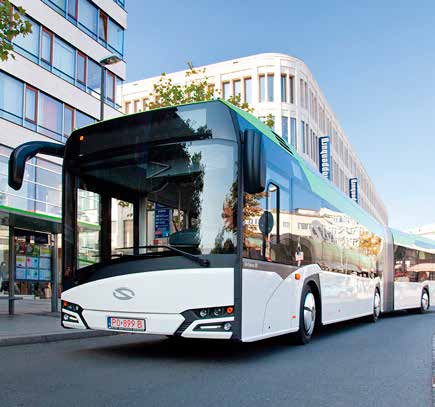Niche products are products that can be produced and sold for specialised use within a particular corresponding market.
Case Study: 3CR12
Solaris is a leading European manufacturer of public transportation vehicles, such as buses, trolley buses and rail vehicles. Most of its bus frames are built from Columbus 3CR12. Since 1996 it has produced about 15 000 buses for 32 different countries.
In the United Kingdom 3CR12 is being used in the main structure for rail wagons used to move Biomass. 3CR12 was chosen because it is much more
corrosion resistant than mild steel and it also has reduced friction which assists in easy discharging. Other rail wagon applications using the 3CR12 grade include coal, the sugar industry, agriculture, abattoirs, light rail, and rail infrastructure industries for example. Road transport covers passenger vehicles, coaches & buses, trucks & freight and utility vehicles applications. 3CR12 is also widely used with petrochemicals, telecommunication cabinets and electrical enclosures, water and sewage treatment.
Case Study: 444
Columbus supplies 444 to one of the world’s leading pump manufacturers - Grundfos. Grade 444 is used to manufacture the inner casing of the induction motor for circulation pumps. In an intricate process, the company creates small and critical components out of massive stainless steel coils.
Case Study: 3CR12 Water Tanks
SkyHill Engineering, a world class state-of-the-art steel heavy engineering shop, part of the large Hydra Arc Group situated in Secunda only 80km away from Columbus, utilised 3CR12, to design and fabricate innovative vertical steel water tanks.
These bulk water storage tanks can be up to 6.5m in diameter, up to 22.4m high, and are fabricated by welding together up to 8mm thick 3CR12 steel
strip-plate produced in Middelburg.
These storage tanks replace traditional concrete tanks, which needed to be emptied for cleaning.
Case Study: 301LN Train Sets
Passenger rail wagons for metro and commuter lines can be manufactured from painted carbon steel, uncoated aluminium or uncoated stainless steel.
Whereas painted steel wagons require re-painting every three or four years, uncoated corrosion resistant stainless steel wagons do not require painting over their entire life cycle of 40 years or longer, resulting in reduced maintenance costs.
Stainless steel train wagons have the added advantage of being able to best absorb impacts from bumps or accidents.
Grade 301LN stainless steel containing nickel, chrome and iron, is similar to standard austenitic grade 304L but with added nitrogen. The higher nitrogen content provides the advantage that it can be work hardened or temper rolled into very high tensile strength, whilst retaining excellent formability, weldability and impact absorption properties. The higher strength of temper rolled 301LN results in a lighter wagon shell structure and thus reduced weight by allowing the use of thinner sections, profiles and panels for passenger rail wagons.
On Metro rail routes, with regular stops and starts at rail stations, lighter wagon weight means energy savings in addition to the lower steel quantity acquisition cost.
Railway equipment manufacturers like Alstom with its X’Strapolis MEGA train as chosen by Passenger Rail South-Africa (PRASA), have embraced 301LN as the best product on the market for railcar bodies to boost their competitiveness. In support of this initiative Columbus introduced this grade into its range of standard products available to the market.
Case Study: The Automotive Market
Columbus supplies 441, 309 and 310 for use in the automotive industry. The biggest portion of material is 441, which is mainly used in manifolds, exhaust systems and catalytic converters. Grade 309 and 310 are used in pre-heaters for diesel engines. Mechanical properties for material going into this industry are very important, and Columbus developed and modified its processes to supply these niche products.
Case Study: Ferritic Plate for Automotive
An application that has been growing over the past few years, is ferritic plate in automotive components. Products such as 409, 409Ni, 436 and 441 plate are used in applications such as exhaust flanges, brackets for truck exhausts, hinges and engine brackets.
Columbus has worked with several end users worldwide on this application. Various grades of ferritic material in typical No 1 finish gauges are used.
Working with its customers Columbus’s team improved product characteristics and quality. This enabled product ranges to be expanded and the compliment it received from a QA manager that “the quality is now as good as, or better, than other suppliers”.




